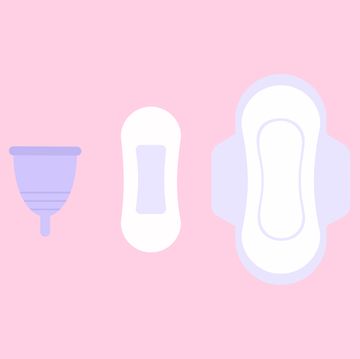Raise your hand if this scenario sounds familiar: You’re getting ready for a night out at a friend’s place, then realize you need to touch up your makeup. So you ask if you can borrow her blush, or eyeliner, or mascara, and she willingly agrees. You spruce up your look, then head out—no harm, no foul, right?
You might want to nix the makeup-sharing habit after you read this story. Jo Gilchrist, 27, told Daily Mail Australia that using a friend’s makeup brush on a pimple landed her with such a severe case of the staph infection Methicillin-resistant Staphylococcus aureus (MRSA) that she lost all feeling in her legs. She says that the friend whose makeup brush she used had a staph infection on her face. Jo has been in the hospital battling the infection since Valentine’s Day.
RELATED: 5 Ways to Steer Clear of Germs in Gym Locker Rooms
“MRSA used to mainly show up in hospital settings, but it’s becoming more commonly community-acquired,” says Darria Long Gillespie, M.D., emergency department physician at Emory Hospital Midtown and senior vice president of clinical strategy at Sharecare, Inc. “It’s usually passed by direct contact through touching someone who has an infection or using an item they used, like a razor or a towel.”
While a makeup brush might be a more unconventional source of the infection, it’s possible. “If someone had an open wound that was draining and some of that drainage got onto the makeup brush, they could possibly transmit MRSA that way,” says Gillespie. “And even if the skin appears intact to the naked eye, it’s always possible there are small microtears.”
But getting MRSA doesn’t automatically mean you’ll wind up with a severe infection since it most often manifests itself as a skin infection. “It might show up as a lump, a small pimple, or a cluster of pimples,” says Gillespie. “It often hurts, is red, swollen, and maybe a little warm.”
In a very small percentage of cases, it can lead to more harmful infections like necrotizing pneumonia; a bone infection called osteomyelitis; endocarditis, which is an infection of the heart’s valves; or meningitis. Meningitis, specifically, is an infection of the areas that surround the brain and the spine, which is where Jo says she was affected.
RELATED: Are You Covering Yourself in Germs Every Time You Flush the Toilet?
At first, Jo says her pain was confusing. “It started as a little ache in my back, and I thought it was my bad posture—but it kept getting worse and worse,” she told Daily Mail Australia. “I was in incredible pain, and nothing would work. I honestly thought I was going to die—the pain was worse than childbirth.” Due to the serious nature of her case, doctors had her airlifted to a different hospital for emergency surgery. When she came to, they broke the news that she’d contracted MRSA and might not be able to walk again. She’s trying to stay positive, though, saying that she’s working on learning to walk again.
RELATED: 7 Sneaky Ways Bacteria Gets Into Your Beauty Products
Since MRSA is an antibiotic-resistant infection, it takes extra effort to clear. Jo is on super strong antibiotics and will be in the hospital for another three months. Her two-year-old son Tommy is passing the time with family until she’s recovered enough to care for him on her own.
Gillespie notes that she can’t comment on whether Jo was actually infected and paralyzed because of contact with the makeup brush, but she says you should avoid sharing makeup anyway as a general hygiene rule.
“At the very least, sharing things like makeup brushes can increase your risk of breakouts,” she says. “When it comes to your eyes, those are mucus membranes. You get tears on eye utensils, and sharing those with other people can increase your risk of infection.”
Razors and towels also make the list of things you should keep to yourself. And even if you’re not passing makeup brushes around your friend circle, Gillespie recommends keeping them clean so harmful bacteria doesn’t get a chance to grow on them. The bottom line is that while the “sharing is caring” maxim applies to many things, your cosmetics supply isn’t one of them.














